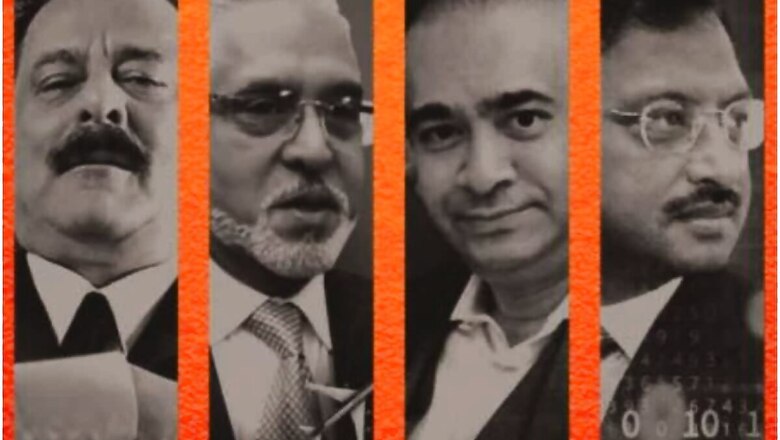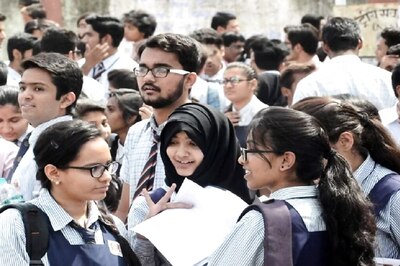
views
Bad Boy Billionaires
Directors: Dylan Mohan Gray, Johanna Hamilton, Nick Reed
There is no simple explanation why India and Indians stood as mute witnesses and callously ignored the excesses of Vijay Mallya, Nirav Modi and Subrata Roy! They could not have been hidden, given the way these men looted the nation, especially the very poor of their meagre incomes, earned through backbreaking sweat and toil.
Netflix’s docu-series, Bad Boy Billionaires, is now streaming with three segments, the fourth on Ramalinga Raju, former Satyam Computers head, having been withheld, at least for the time being. While Mallya and Modi are now in London fighting the legal process to extradite them, Roy is out on parole after being in jail for a couple of years.
Who would not remember Mallya and his unbelievably extravagant lifestyle awash with the grandest of parties? Dylan Mohan Gray explores this in The King of Good Times. The man is still having a whale of a time in London walking free and attending art exhibitions as well as parties. Gray uses archival footage and interviews with Mallya’s son, Sid, executive assistant Tushita Patel and family friend Kiran Mazumdar Shaw (Chairperson of Biocon, a Bengaluru-based biotechnology company).
The episode follows Mallya as he rises inheriting his father’s brewery business and later getting into racing, cricket and airlines. His downfall comes when he spends fortunes on racing and cricket impeding his payments to the Kingfisher Airlines employees. While they were protesting and marching on the streets, demanding their dues, Mallya was busy with his insanely lavish 60thbirthday bash, which also came as the turning point that drowned him.
He escaped to London hoodwinking the Indian authorities. He owes India Rs 9,000 crore, and mind you, this is the tax-payers’ hard-earned money. As one of the interviewees quips, “Vijay must be wondering every night why he did not return that sum”.
Johanna Hamilton’s Diamonds Aren’t Forever on diamantaire du jour Nirav Modi is the weakest of the three parts with a passing mention of his wife and uncle Mehul Choksi.
Born in Gujarat, Modi came into fame and fortune when he established his exquisite jewellery business. He had literally risen from nothing, and those who worked for him still hope that he would return and open his diamond factories. Modi loved a good life, and this needed enormous sums of money. His lifestyle was lavish, to say the least. However, all this came tumbling down when an employee of one small, insignificant branch of the Punjab National Bank in Mumbai retired after having sanctioned huge loans on very flexible terms. He is now awaiting trial.
Nick Reed tells us about the crazy sycophancy around Subrata Roy. He, bypassed banking systems and went straight to the masses, becoming a cult personality: his way of greeting, his dress code and the chit fund business that roped in millions of Indians, the poorest of the poor.
Titled The World’s Biggest Family, this part, the longest of the lot, says that there was a point in time when Roy’s chit fund venture had one in 17 Indians as his depositor! Eventually, when the depositors needed money for a wedding or college education or medical care, Roy failed them. Their God – whom people thought could do no wrong – was soon seen as a mere criminal. He took away the meagre earnings of the daily wage earner promising double dividends. But nothing came. And it seemed such a shame when Roy had yoga classes in jail!
The series had a certain potential, but it did not make use of it, maybe the ongoing legal cases were an obstacle. So, what we get is what we have in the public domain, newspaper reports and like.
To me, the episodes seemed like yet another PR exercise. It did not display hard criticism against men like Mallya, Modi or Roy – all whom literally stole public money. Men and women leading a life of grinding poverty lost the very little they had to fund Roy’s unreal ambitions and a life that spelt vulgarity. Mallya lived like a king, his grand parties, his calendar girls playing like a halo around him. Modi might have been a little more circumspect, but took away tax-payers money, and no small amount that was.
Bad Boy Billionaires has a cohesive narrative and highlights how institutional corruption and mismanagement are endemic in a nation where millions go hungry every night. Call it greed or complete lack of empathy for the downtrodden.
Finally, let us not forget that the system allowed these men to plunder and go scot free for a long, long time.
Rating: 2/5
















Comments
0 comment